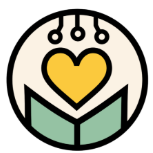WINDEE


Project summary: The well-being of students and educators in digital education is crucial. Our policy experimentation project addresses the lack of understanding, strategies, and coordinated policy efforts in this area. We build evidence, create solutions, and conduct experiments to refine and implement systemic policy changes. The project begins with comprehensive evidence building through research, assessment, and policy mapping on digital well-being. We then develop Digital Well-being Framework, integrating:
- Person-specific factors including digital competences and health considerations.
- Context-specific factors involving educational environment, learning design and school culture.
- Device-specific factors pertaining to the types of digital devices and best practices for safe and balanced use.
The Digital Well-being Framework provides principles for responsible technology use and strategies for creating balanced digital learning environments. It includes practical recommendations for selecting technological solutions well-suited for learning design. We test the Digital Well-being Framework through experimentation in real-world educational settings. This iterative process refines our strategies, ensuring they are effective and relevant. Ultimately, we influence educational policies at regional, national, and European levels. By creating evidence-based policy recommendations and fostering systemic change, we strive to embed digital well-being into every classroom. A strong partnership of universities, schools, policymakers, and EdTech experts, enhances the project’s capacity to address the complex challenges of digital well-being in education.
| Project title: | Well-being in Digital Education Ecosystem (WINDEE) |
| Project No: | 101195779 WINDEE — ERASMUS-EDU-2024-POL-EXP |
| Project coordinator: | Vytautas Magnus University (VMU), (Lithuania) |
| Contact persons at VMU: | prof. dr. A. Volungeviciene, airina.volungeviciene@vdu.lt |
| Project run: | 36 months (March 2025 – February 2028) |
| Project budget: | 998 230.00 EUR |
| Project page: | https://windee.eu/ |
Partners:
- KIC – Knowledge Innovation Centre (Malta)
- TLU – Tallinn University (Estonia)
- UOC – Open University of Catalonia (Spain)
- EDEN – Digital Learning Europe (Estonia)
- EUN – PARTNERSHIP AISBL (Belgium)
- EDUCRAFTOR OY AB (Finland)
- NATIONAL AGENCY FOR EDUCATION (Lithuania)
Associated partners:
- LieDM – Lithuanian Association of Distance and e-Learning (Lithuania)
- LKNUC – Lithuanian Educational Centre for the Deaf and Hard of Hearing (Lithuania)
- Stifterverband – Stifterverband fur die Deutsche Wissenschaft (Germany)
General Objectives:
- Improve digital skills and competences among teachers and students to support effective learning and teaching.
- Develop and refine digital learning environments to ensure they support students’ physical, cognitive, emotional, and psychological well-being.
- Integrate digital competences into curriculum design to foster a cohesive and inclusive educational experience.
- Engage educators, policymakers, and communities to collaboratively promote digital well-being in education.
- Use research, data, and policy experimentation to inform policy development and implementation strategies that enhance digital education practices.
- Contribute to the strategic goals of the European Education Area, the European Higher Education Area, and the Digital Education Action Plan.
Work packages:
- PROJECT MANAGEMENT AND QUALITY ASSURANCE
- ASSESSMENT OF DIGITAL WELL-BEING IN EDUCATIONAL ECOSYSTEM
- INSIGHT ANALYSIS AND FRAMEWORK DEVELOPMENT
- EDUCATOR EMPOWERMENT
- POLICY EXPERIMENTATION AND IMPLEMENTATION
- DISSEMINATION, OUTREACH AND IMPACT
DISCLAIMER: “Funded by the European Union. Views and opinions expressed are however those of the author(s) only and do not necessarily reflect those of the European Union or the European Education and Culture Executive Agency (EACEA). Neither the European Union nor EACEA can be held responsible for them.”
Digital Well-being in the European Digital Education Ecosystem
Meeting with OECD representatives to discuss digital education in Lithuania









